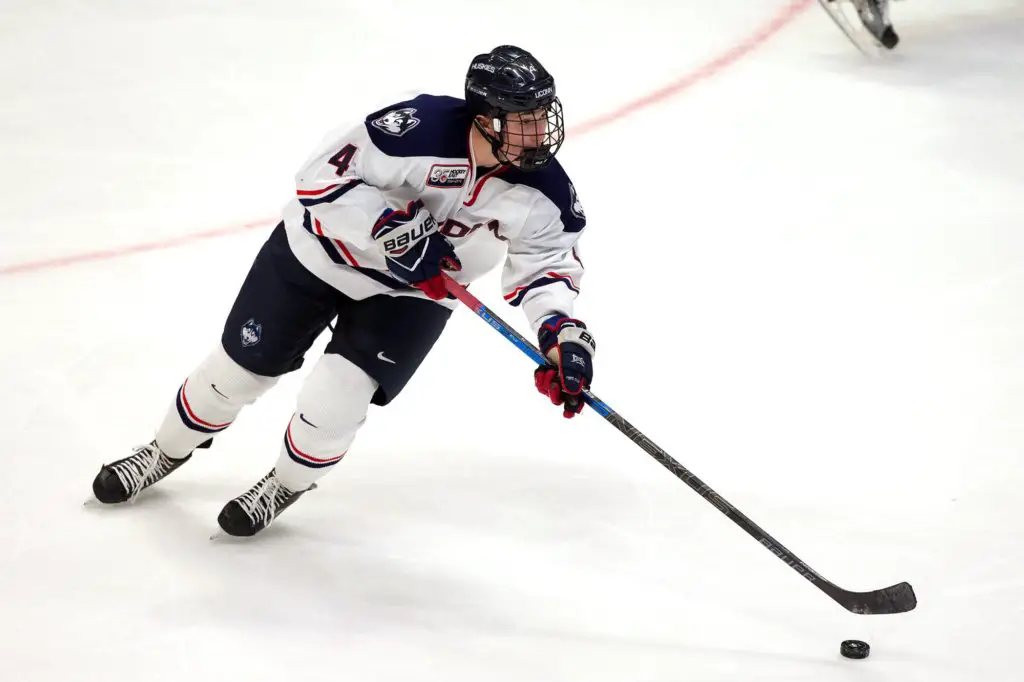
Building and continuously rebuilding a college sports program is easily the greatest challenge that every coaching staff faces.
Success, particularly in college hockey, often leads to NHL teams taking notice and players being snatched prior to the conclusion of their four-year college career, often leaving significant holes in a lineup.
Three years ago, Connecticut coach Mike Cavanaugh faced exactly that.
After taking over as head coach in 2014, Cavanaugh watched his first full recruiting class graduate. The 2017-18 Huskies team finished fifth in Hockey East, winning 15 games, the most since the program moved to Hockey East. In the playoffs, they fell to the eventual champion, Boston University, in two games, both one-goal contests, the first going to overtime.
Cavanaugh graduated nine that summer while his top scorer Maxim Letunov and well-thought-of defenseman Joe Masonius both turned professional.
“That year, I thought we really made a breakthrough as a program,” said Cavanaugh. “We lost [11] players and we brought in a real big [recruiting] class.”
It was a feeling that was familiar to Cavanaugh.
As an assistant at Boston College, he recalled the 2001 national championship team that lost eight players to graduation and three more to the NHL. While this may have been a smaller scale at UConn, the feelings as a coach were similar.
“As good of hockey players as they are, when they’re asked to come in as freshmen and play really big roles and big minutes, it’s hard,” Cavanaugh. “It’s hard to ask them to play the roles and be successful as a team, I don’t care how good your players are.”
The members of that freshman class from 2018 are now juniors and having a massive impact on Cavanaugh’s Huskies team. None was that more apparent than last weekend when four of those juniors shined brightly in UConn’s two-game sweep of New Hampshire that brought the team to .500 at 5-5-1 overall and a .545 percentage of total points won in Hockey East.
In the series opener, Carter Turnbull was the hero, notching a hat trick, including the game-winning goal in 3-on-3 overtime. On Saturday, classmate Jonny Evans notched two goals to go along with his goal and assist on Friday.
And throughout the weekend, fellow Czech countrymen and junior classmates Jachym Kondelik (five assists) and Tomas Vomacka (two wins, 49 saves in two games) were elite as well.
The progress is something Cavanaugh has seen from this class, which also includes key contributors Roman Kinal, Marc Gatcomb, Kale Howarth, Ryan Wheeler and John Wojciechowski, since the end of their freshman campaign.
“By the end of their freshman year, we won five games down the stretch to finish,” Cavanaugh said. “Last year, I think they took even more strides as players. We had our first winning record in Hockey East.
“Now they’re in the role of leadership. They’re used to my expectations for the team. They understand how we want to do things here as a program. I think it a lot of ways, they’re a lot more comfortable in the experience to lead in those situations.”
Offensively, the junior class has been a strong contributor. Led by Evans 13 points in 11 games (six goals, seven assists), the class represents four of the top five scorers on the team. And in net, Vomacka, who has been considered a solid goaltender over his three years, has taken a major step forward this season.
“I think the thing that [Vomacka] has worked on, he’s always been super athletic and that’s been his calling card, and he would rely on his athleticism to make saves. Now he’s a more efficient goaltender,” Cavanaugh said. “If he’s not making athletic saves, he’s probably playing better. I think he’s really worked hard at his positional play, staying more positionally sound and use his athleticism when he absolutely has to.”
It is experience that Cavanaugh will call upon as this team moves forward, hoping to position itself for a top-four spot and home ice in Hockey East.
“Three years ago, not only were we one of the youngest teams, we were the least experienced team in the league,” Cavanaugh said. “We didn’t have a lot of guys with college hockey games under their belts.
“That’s more important that age to me. That’s something you’re going to see teams that don’t have that type of experience struggle at times, and we did that year.
“But struggle is good. It’s going to make your stronger when you get through it on the other end.”
Boston University finding success after a long wait
While multiple teams have had stops and starts to this hockey season, perhaps no team had the difficulty of waiting than did Boston University.
Because of a university mandate, the Terriers weren’t allowed to play their first game until after the New Year, finally opening their season on January 8 with a 7-3 loss to then-No. 16 Providence.
“There’s times that you can’t play, and you can’t control that,” said BU coach Albie O’Connell. “The want [of the players] was always there. The guys just want to play hockey.
“Our senior class is the glue. We’ve got 14 sophomores and freshmen. And these guys have been pretty even about the entire thing, knowing we’d eventually get the opportunity to play.”
O’Connell admits that the most important aspect to getting through three months without games wasn’t staying in game shape or sharp on the ice. It wasn’t necessarily even keep the bodies well tuned.
It was about maintain the players’ minds.
“They’ve had a good calm, mental approach,” said O’Connell. “[Not playing] could drive you crazy if you don’t stay even. Mentally, that’s where the leadership comes in of guys being patient.
“It’s hasn’t been perfect. But the fact that we’re able to play two consecutive weekends is good.”
Since that loss to Providence to open, BU has responded with three straight wins, including a two-game series sweep against nationally-ranked Massachusetts this past Sunday and Monday. That’s a positive sign for O’Connell moving forward.
“Overall, I was pretty excited about the effort, the competitiveness and attention to detail when we haven’t been on the ice that much,” O’Connell said. “Guys are listening and performing at a high level despite all the circumstance, it’s been a pleasure to watch.”
Throw out those Hockey East schedules
It was announced on Tuesday by the league that the composite league schedule released prior to the season is being abandoned and substituted with a week-to-week series that will be decided upon by the league office prior to each week.
Under the new plan, coaches and athletic directors will be given some initial guidance to their opponents on Monday morning, according to the league. Then based on logistics to figure out game times and locations, the league will finalize the schedule each Tuesday. That doesn’t mean, still, that every game will be played as COVID testing still dictates each team’s availability that weekend.
The reasoning has to do with balance and equity. While multiple programs have been paused or stopped and started due to either school/state regulations or cases of COVID within the programs, those that have been able to play have been scheduling games ad hoc.
The league already announced in late November that all games this season would count towards the league standings. And because of that, there is now a great disparity in numbers of games that have been played. UMass has played 15 times; UMass Lowell and BU have played just four.
While certainly there will be an effort to help teams lacking in games played catch up to others, the league will also use this change to the scheduling format to ensure that schools that have already played a higher number of games isn’t sitting out multiple weekends in a row.
Certainly, it’s a strange approach but seems necessary. The league can help become a logistics clearinghouse working with available schools each weekend to find ways to maximize the schedules in a fair and equitable way for each and every team.


